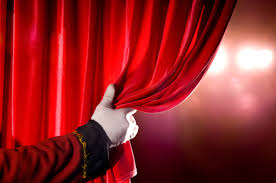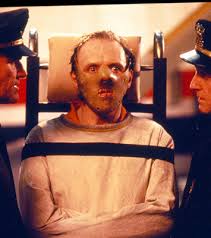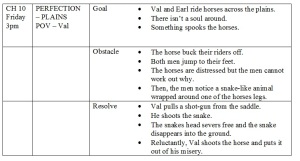I’m probably going to be stoned for saying this, but I hate the 3-Act structure, and sometimes wonder why we writers are so hooked on using it.
This doesn’t mean a writer is free to just type away without any structure in place, because they do… But, the 3-Act structure? Really?
Talk to any screenwriter and they will tell you how important the 3-Act (or sometimes 6-Act) structure is. Same goes for theatres, which is really where the 3-Act structure was born. However, doesn’t an ‘act’ just serve as a pre-commercial cliff-hanger? And seeing as novels don’t have commercials, do we really need to use the 3-Act structure? And I’m not alone in this reasoning. Raindance and James Bonnet agree.
Now, before you all start screaming that books have chapters, which kind of serves as a commercial break. I agree. Totally. One hundred per cent. Every chapter should end with some element of a hook to make your reader keep reading… So put down those torches. I don’t need to be burned at the stake just yet.
So before I find myself declared a witch, and tied to a piece of wood centre of a bonfire, let’s break this down.
Below is a graph of how the 3-Act structure is declared to work.
ACT ONE = Set Up
This act serves as a platform for you to introduce your characters.
Normal World – This is where you set everything up.
Inciting Incident – Something has to happen that forces the protagonist to change their normal day-to-day routine. This is where the story starts. Now the protagonist has a goal.
Obstacle – The first obstacle (or plot point one) occurs and throws your protagonist into turmoil.
ACT TWO = Confrontation
Obstacle, Obstacle, Obstacle – Your protagonist will hit problem after problem, which inevitably stops them from reaching their goal, and gives them a fight on their hands.
Midway Point – Gives the illusion that the Protagonist is close to achieving their goal.
Darkest Moment – This is where everything goes wrong. The Protagonist is at their lowest point and is ready to throw in the towel. They can see no light at the end of the tunnel.
ACT THREE – Resolution
Big Bad Battle – The Protagonist comes back (sometimes from the dead), and ultimately has to fight the baddie for survival.
Climax – The Protagonist wins the battle, or if you’re in a Nicholas Sparks story, they die.
Conclusion – Things calm down, and normality ensues.
Now, the reason I do not necessarily like all this 3-Act structure malarkey, is because it’s so damn confusing. The rules change depending on which website you read. Where one site adamantly spews that all your characters have to be introduced in Act One, and that the midway point actually means the lowest point; another site will report that Act Two is where you introduce the mentors and love interests, and the lowest point happens a smidgen before Act 3 begins. It’s enough to drive even the most sane writers crazy. One thing I have found that’s 90% consistent is the allowance for each Act. Act One, or the set up of you story, is usually given a quarter of your book. Act Two gets a whopping fifty per cent to fill with confrontation, and Act Three needs only a quarter to show the conclusion.
However, I DO agree that there is a formula to story writing. And I also agree that any ‘normal world’ belongs firmly at the beginning, and the conclusion’s place is most definitely at the end. That’s the way ‘life’ actually happens. The day begins like any other, then a dollop of a problem lands on your doorstep, which changes the course of your day, if only for an hour or so, and no matter how hard you try and overcome it, more problems pile up around it until you just feel like throwing in the towel. Ultimately, though, we always fight through, and win.
I’m not saying the 3-Act Structure doesn’t use this formula, because it does. I just find it too restricting, and any new writer looking to learn this craft, although getting a gist of the information, has one hell of task on their hands as the information out there is so conflicting – yes, I even found one that compares the structure to a shark.
My advice, for what it’s worth? Stick to the formula: Normal World, Inciting Incident, Obstacles, Start to win, Darkest Moment, Big Bad Battle, Climax, Conclusion, and you won’t go wrong.
So, what is the ‘traditional’ 3-Act structure you use, or do you have your own formula? Do you find the information on the website confusing? Maybe you have a site you find invaluable. Let me know below!
If you want more of me, try checking out: Facebook, Twitter, Google+, Instagram, YouTube, and Linkedin.
Join my email list and be first to hear about upcoming releases and offers.





























